
Topics
Guests
- Jennifer Robinsonco-founder of International Lawyers for West Papua.
- Benny WendaWest Papuan independence leader
A group of Australian and West Papuan activists have set sail on a Freedom Flotilla bound for the Indonesian territory of West Papua. Organizers say they are seeking to draw attention to West Papua’s struggle for independence and to human rights abuses during 50 years of Indonesian rule. In February, Democracy Now! interviewed West Papuan independence leader Benny Wenda and Jennifer Robinson, co-founder of International Lawyers for West Papua.
Wenda visited the United States in February to meet with members of Congress and the United Nations to discuss the state of his homeland. Despite being home to some of the world’s largest gold mines and natural gas deposits, the people of West Papua remain some of the poorest in Indonesia. In 2002, Wenda’s struggle for justice as part of the independence movement landed him in police custody. He escaped from jail and fled to the United Kingdom, where he was granted political asylum. In 2011, the Indonesian government issued an Interpol red notice seeking his arrest and extradition. That has since been dropped.
BENNY WENDA: [singing]
AMY GOODMAN: Thank you. Benny Wenda is our guest, a leader in the fight for independence in West Papua. He’s here in the United States to meet with members of Congress and the United Nations to discuss the state of his homeland. Despite being home to some of the world’s largest gold and natural gas deposits, the people of West Papua remain some of the poorest in Indonesia. In 2002, Benny Wenda’s struggle for justice as part of the independence movement landed him in police custody. He escaped from jail, fled to Britain, where he was granted political asylum. In 2011, the Indonesian government issued an Interpol red notice seeking his arrest and extradition. That’s since been dropped. This is Benny Wenda’s first official overseas tour.
We’re also joined by his lawyer, Jennifer Robinson, who is co-founder of International Lawyers for West Papua, also one of the attorneys for WikiLeaks founder Julian Assange.
And we welcome you both to Democracy Now! Jen, why don’t you give us a little history on how you got involved with the West Papuan movement, how you came to be in West Papua? And then we’ll hear the story, Benny Wenda’s story, from Benny himself.
JENNIFER ROBINSON: Sure. More than a decade ago, I went to spend some time in West Papua working with a human rights organization at a time when Benny was in fact a political prisoner. I worked on his trial and subsequently his asylum application. But as a young Australian turning up in West Papua, I was not quite aware of the history of West Papua and its long struggle for self-determination from Indonesia. West Papua was in fact, in the 1960s, on the non-self-governing territories list, due to be given independence as a former Dutch colony, when Indonesia invaded. And as a result of negotiations between the U.S., the Dutch and Indonesia, Indonesia was to take custody of the territory on condition that it gave a vote for self-determination. That vote for self-determination took place in 1969 in sham circumstances where a handful of West Papuan leaders were forced to vote under threat of violence. And since that time, since becoming part of Indonesia against their will and in breach of international law, the West Papuan people have suffered widespread human rights abuses. Benny himself was one of the brave young leaders who stood up in very difficult circumstances in Indonesia to put forward the claims of the West Papuan people and, as a result, was politically persecuted. And I’m very grateful for the time that I had in West Papua to see firsthand just how bad the situation is and, since that time, have continued my interest through supporting Benny and West Papuan activists around the world.
AMY GOODMAN: Benny Wenda, talk about your country. Talk about West Papua. Talk about how you ended up in jail and then in Britain.
BENNY WENDA: Yeah, firstly, yeah, thank you very much for this opportunity. And this is only way to spread our message, to tell what really happened and what really going on. Yeah, why I involved this struggle, because I myself have witnessed, and even I myself suffering from this condition—at a time when I was child, Indonesia bombing my village, and my leg was broken. And that sentiment, I grow up five years in the jungle. And 1984, we’re loyal to Indonesia since then. I find out—I went to school, and then I—there was a lot of discrimination, racism, and also imprisonment and killing, and took place by Indonesian military itself. And I grow up that situation, and I went to the college, and I study the politics. And then I went—sometime I go back to my village, and I saw my people are beaten and tortured. Even you have a beard or even you have a dreadlock, and Indonesia military stop, then beating my people. That is the sentiment that I grow, and that situation. Even my own auntie raped in front of my eye. I couldn’t do it at the time, a young boy. That is a sentiment grow up in there.
AMY GOODMAN: Why is Indonesia committing this violence in West Papua?
BENNY WENDA: It’s simply we are one thing, that we are different color, and they look at West Papua as a subhuman. That is simple as that. So, that’s why—also, we are a colony, you know? Indonesia look at my people and myself as a colony. This is the 21st century. Basically, we are still under Indonesia illegal occupation in West Papua. So, they do whatever they like, because why? There is no journalists. International media, like Red Cross and Amnesty International and all the media are banned. It’s like we are—struggle in the prison, you know? That’s why I stood up and why we are all human beings. We want to free, you know, from the colonialism, from oppressor. But Indonesia committed genocide toward my people. That’s why—why we all want to free, that I joined the struggle for fight for free.
AMY GOODMAN: Jen Robinson, can you talk about the role of U.S. corporations in West Papua?
JENNIFER ROBINSON: Absolutely, in particular Freeport gold mine, which is a U.S. corporation, which operates the largest gold and copper mine in the world in West Papua. The concession agreement for that mine was signed two years prior to the vote for self-determination between Indonesia and the United States, which gives you a very good idea about what people thought the outcome of the vote for self-determination would be. Those economic vested interests that—within Indonesia, within West Papua, because of the great wealth of natural resources on the—within the province—they have the largest tract of rain forests outside of the Amazon. They have the largest gold and copper deposit in the world, one of the largest natural gas deposits in the world. So there’s huge vested interests for Indonesia in maintaining West Papua as part of Indonesia. But, unfortunately, as you mentioned earlier, West Papuans are not reaping the benefits from this economic development. They are among the poorest in the country. The health standards are among the poorest. There’s a huge HIV epidemic. And Indonesia simply is not taking care of the West Papuan people, as is their duty. They have been struggling for self-determination for more than 40 years, in circumstances where it’s really one of the world’s forgotten conflicts.
AMY GOODMAN: Benny Wenda, talk about how you ended up in jail in West Papua, and, ultimately, how you escaped and ended up in Britain with political asylum.
BENNY WENDA: Yes, this is a very long story, but I just want to brief. Yes, 2000, there is openness of the democracy in all Indonesia, and particularly in West Papua, last 30 years under Suharto, people are like—you know, couldn’t say even word “West Papua.” Then, when we—there is openness of democracy, and everybody came out, and we want to independent, asking the Indonesian government. That’s—then we—every West Papuan came out on the street: “Well, we want to independent. This is the time.” So I one of the leading directly with all the activists, and we formed a congress in 2000, and I directly lead that movement. And one of my friend now, Filep Karma, he’s one of the committee flag rising, and I’m a leader of that. We raised the Morning Star flag in 2000. That crime—
AMY GOODMAN: When you raised the West Papuan flag?
BENNY WENDA: West Papua flag.
AMY GOODMAN: In a country occupied—
BENNY WENDA: In the—yeah, yeah, this is their flag.
AMY GOODMAN: In a place that is occupied by Indonesia.
BENNY WENDA: This is their flag, their national flag. It’s not Cuba, but it’s a West Papua flag. So we peacefully raised that Morning Star flag. And then, the allegation that Indonesia accused me is just false. You know, they false charge, and they put me—charge me 25 years, and I’ve been—seven times went to the court, no evidence, no witness, and Jen herself watching in the courtroom. And I always said, “Who is witness? What is my crime?” And they never brought the witness. Then, the end, three times they trying to kill me inside the prison, because 2001, they killed Theys Eluay, one of the independence leaders, as slayed by Indonesia’s special force, and then, 2002, they targeted me, and they put me in prison. They want to kill me inside prison. That is the—if I stay, I will be killed. Better maybe while I escape and then they kill me—that’s my decision. So I managed to escape and cross—
AMY GOODMAN: How did you escape?
BENNY WENDA: Yeah, it’s really great story, because one of the film, American Prison Break, and I watched that film a few years ago, and this is—I said, “This is what I did.” It’s really great, and this is my—exactly my experience. I break the ventilations, and from that hole I escape, and I managed to escape and then cross the border to Papua New Guinea. And I got a fake passport, and I came to United Kingdom.
AMY GOODMAN: And you were granted political asylum in Britain.
BENNY WENDA: Yes.
AMY GOODMAN: Can you talk about the struggle to grant Benny Wenda political asylum in Britain, where you live now?
JENNIFER ROBINSON: Sure. After Benny managed to escape from prison, with a group of friends we managed to bring him to the United Kingdom, where we knew they had very robust political asylum protections. Basically, we sought political asylum on the basis of the political persecution that he had suffered, both prior to being sent to prison—as a leader of the independence movement, he had been persecuted by the authorities, and his name was mentioned on secret police documents alongside other Papuan leaders who had been either assassinated or targeted in similar ways. Once he was sent to prison, he was sent to prison for charges that were politically motivated. There was no evidence to form the basis of those charges, and I know for a fact, because I sat in and observed the court proceedings the entire time. He was also subjected to torture in prison. And thankfully, the British government granted that asylum on the basis that if he were returned to Indonesia, he would suffer persecution again and potentially face life-threatening situations.
What is most interesting is, 10 years later, once his international campaign took off, Indonesia sought an Interpol red notice for the very same politically motivated charges for which he was granted asylum in the U.K., extending their persecution beyond borders using the Interpol arrest warrant system. And it took us more than two years to fight that. With the help of Fair Trials International, we happened to have been able to get it removed on the grounds, again, that it was politically motivated and sought to extend their persecution. And that’s why Benny is able to travel today.
AMY GOODMAN: The companies, Freeport-McMoRan, a powerful U.S. company—gold, copper mining company that is in West Papua—I mean, I remember years ago, as we covered East Timor, the story of Freeport-McMoRan flying in congressmembers, politicians, to look at the success that was West Papua, but having to fly in a different route so that they wouldn’t show the devastation caused by the mining, the devastation to the earth. Freeport-McMoRan, BP, Rio Tinto, some of the companies, if you could talk about their—these other companies?
JENNIFER ROBINSON: Absolutely. BP has a natural gas exploitation project in West Papua. Rio Tinto now part-owns Freeport gold mine. Freeport gold mine is incredibly problematic in terms of the environmental degradation that it has impacted upon West Papua, so badly that the overseas protection insurance from the U.S. government was denied. The Norwegian government has divested itself of investment in Freeport because of social—unfair social practices and human rights abuse concerns. More recently, the New Zealand pension funds have divested themselves of their investments in both Rio Tinto and Freeport, for exactly the same concerns. There have been widespread allegations of torture and abuse around the gold mine, killings of both foreigners and local West Papuans and Indonesians by security services who are on the payroll of Freeport gold mine. This is a huge issue that does not get sufficient media attention.
AMY GOODMAN: Well, explain that, the issue of Freeport, this U.S. company, paying Indonesian soldiers.
JENNIFER ROBINSON: To protect the security of the mine. And since that time, in the sense of paying them for their services, those security services have performed human rights abuse around the mine. And we’ve seen a number of important international human rights cases being brought against U.S. gold mines and U.S.—U.S. interests, corporations abroad, for the impact they’ve had on the local population. And I think Freeport is in the category of those other gold mines.
AMY GOODMAN: Benny Wenda, you were in the news recently, joining leaders across West Papua in demanding that Jared Diamond, the author, apologize for describing West Papuans in his new book as “warlike,” strengthening the idea that indigenous people are backwards. His new book, The World Until Yesterday: What Can We Learn from Traditional Societies?
BENNY WENDA: Yeah, this—yes, I make a comment and statement on that, because it’s like he’s not trying to explain what the real—what real situation in West Papua. He’s trying to educate the world that these are savages people, and this is a—you know, as if too primitive. And this—so, that kind of genocide committed by the tribals themselves. And this the idea the other way around. Genocide are committed by Indonesia government, from 1960, where they illegally occupied, and until today. And he didn’t mention any of those allegations committed by Indonesia only. So, that’s why I said, “We are all human beings. There is no—what he mentioned is nonsense.” That’s why every Papuan, especially my tribe—I’m a Lani, and I know exactly what my people are, you know, traditionally from the—I’m also chief, so I know exactly what he’s talking about. That’s why I a little bit disagree with his book.
AMY GOODMAN: Benny Wenda, the United States has announced it’s going to sell Indonesia eight Apache helicopters. In 2011, the U.S. announced it was giving Indonesia two dozen second-hand F-16 fighter planes. What is your reaction to this?
BENNY WENDA: I see this is—they give a wrong hand, because we have experienced, myself, as Indonesia bombing my village 1977. My leg was broken. Indonesia used the hot jet and also helicopter. What happened in East Timor? Look what happened in East Timor. Same thing, it will happen, if Indonesia is—they are not using that for protection reason, but they want to use that weapon intimidate my people. This is the reality in the field. And I’m worried that maybe 10 years, 20 years time, Indonesia will wipe out my people, because those weapon are now using, but they will using to intimidate my people, because we all came out on the street trying to tell the world peacefully that always intimidate by hot jet, helicopter, sold by U.S., British and some other Europeans. So that’s why I think that U.S. not sell this weapon and hot jet, as well as the helicopters, to Indonesia. It’s wrong hand. They will misuse to scare my people.
AMY GOODMAN: What are you telling politicians in Washington?
BENNY WENDA: I said we are—I said to the few Senate and Congress, I said, “We are now—this is 21st century. We struggle for independence, that my peoples just—there is no way with Indonesia, because Indonesia not look at us as human being, but they look at us as subhuman. They will wipe out before. U.S. is the biggest power in the world, and it can change. So please help us. If we live longer with Indonesia, we will never exist.” That’s why I said, “Please help us.” And, yeah, there is few—
AMY GOODMAN: What are you demanding of Indonesia? Are you demanding West Papua become an independent nation?
BENNY WENDA: Yes, West Papua be free, an independent country, because we already got independence in 1960. And after one year, Indonesia invaded 1963. So that’s why we want to free, independent from Indonesia. That’s the simple.
AMY GOODMAN: How would you compare West Papua with East Timor?
BENNY WENDA: East Timor and—yeah, East Timor got independent because the Portuguese are behind it. But West Papua had the Dutch, you know, leave us. So, that’s why I’m going around the world seeking help, because our struggle is world-ignored. But I hope that this 21st century we are fighting colonialism. I hope the new generation, either U.S. or American—American new generation, and European and Australia, wherever I go, I will tell this is—we are struggle for independent.
AMY GOODMAN: What would you see as the path to independence for West Papua today?
BENNY WENDA: We have learned a lot of experience. People thought South Africa never free, but they’re fighting for justice and freedom. They are free now. Even East Timor, also western—South Sudan, Kosovo, it’s same story. And Palestine, a same story, because they are seeking self-determination. West Papua is seeking self-determination. Our right to free, 1969, under the international law, we are betrayed. So that’s why I’m asking U.S. need to change the policy, to look at what happened, the history. I hope this generation—I hope will, if they become a leader, I hope they will change in attitude toward West Papua.
AMY GOODMAN: President Obama grew up partly in Indonesia, the only president of the United States who did. What message do you have for him?
BENNY WENDA: He grew up, four years—he is child. He’s facing that—I think he grow up among the Indonesian boys. He look at himself different color. The Papuan are treated also different color. That’s why he has this experience. I hope he can look at West Papua, to free us, because there is no hope. Only Obama can help us to be free, because his father also among the army. And he tells story about West Papua, that we had the war going on in West Papua. And Obama knows that. So I hope I’m right place, and I hope he could listen what I say. I really need help, because we are—we are—there is no hope left. Hand of Indonesia, we will the wipe out, so that is the simple question.
AMY GOODMAN: Jennifer Robinson, from a legal perspective, how do you see this path to independence taking place?
JENNIFER ROBINSON: Well, we’ve already seen in the case of East Timor that a U.N.-provided self-determination vote was very successful. West Papua was the first-ever U.N.-administered territory. The U.N. should acknowledge its mistakes in what took place in the ’60s and provide a vote again for the indigenous West Papuan people to exercise that right fully and properly in accordance with international law.
I’m very glad you raised President Obama, because, in fact, his stepfather, when he was living in Indonesia, served in West Papua for the Indonesian military right at the time when Indonesia was strengthening its grip on the territory. And he recalls in his book, Dreams of My Father, the stories that his stepfather told him about the oppression of the West Papuan people. And he took lessons from that. He took lessons from that, saying his stepfather said to him, “If you can’t be strong, find friends to be strong, because stronger people will take your land and take your women and take your resources.” That’s a direct quote from Obama’s own book. So he has direct personal experience of how devastating the Indonesian military occupation was through his own stepfather.
And when he came into presidency, he said, because of his experience in Indonesia, that he will be able to say things to Indonesia that other leaders have not been able to. And so far, on West Papua, he has failed. In the WikiLeaks cables, we learned that Obama has reinitiated military aid, as you mentioned earlier, with Indonesia, despite knowing that there are ongoing human rights abuse in West Papua. That military aid was cut after East Timor. It was reintroduced, even though they know exactly what’s going on. And, to me, that is unacceptable, given his history, his background and his knowledge of the situation.
AMY GOODMAN: Talk about the significance of the United States. I mean, Indonesia obviously is a separate country, but the weight, the power that the United States has, and the U.S. corporations that are involved in West Papua, in determining West Papua’s future.
JENNIFER ROBINSON: The power of the United States, and in particular its corporations, cannot be underestimated in this negotiation process. It both has a historical duty. The U.S. was the country that brokered the deal between Indonesia and the Dutch at the time, which sealed West Papua’s fate as part of Indonesia. And the U.S. did not stand up and speak out against the violence against the West Papuan people at the time. There are diplomatic cables showing that the U.S. ambassador to Indonesia reported back to Washington saying that there was fear among the West Papuans of impending genocide as a result of the violence leading up to the vote, and the U.S. said nothing. It is high time that the U.S. stands up and says something about this.
AMY GOODMAN: Didn’t Robert Kennedy go to West Papua with his wife, Ethel Kennedy?
JENNIFER ROBINSON: I understand that he did, yes.
AMY GOODMAN: Benny Wenda, as we wrap up, what message do you have for the American people? We’ve been talking a lot about power. You’re visiting politicians. We’ve talked about President Obama, U.S. corporations. But the American people?
BENNY WENDA: I hope this is time for American people could stood up and to support, because American people believe in liberty and democracy and peace and justice all over the world—in fact, that in Middle East and all the continent, are supporting democracy and justice and freedom. So, we, West Papua, voiceless, only hope the American people could help us to get out from this genocide committed by Indonesia. There is no way—we cannot live with Indonesia, because Indonesia has committed genocide. I hope that all the listeners could stood up and please pray, and because this is something that I brought the message. I carry this message, a burden of my people. I cry. My people cry for freedom last 50 years, and I’m still cry, because I see my people as human being. Sometime my heart cry, “Why the world not listen?”
AMY GOODMAN: Can you return to West Papua?
BENNY WENDA: No, I cannot go back, until—
AMY GOODMAN: Why?
BENNY WENDA: Indonesia will put me in prison, and they will kill me. That’s why better when I free, and I will go back a free man to meet my people.
AMY GOODMAN: Can you describe your headdress? For radio listeners, they can’t see it. So, if you would say in words this extraordinary headdress that you’re wearing.
BENNY WENDA: This is—I’m also—symbolize the bringing of unity of my people, as well as a sign of the I’m a leader as well as I’m a chief. So, this is the—this is almost crown, but it’s not crown. This is—my people said that “You use this when go around the world. This is our symbol. This is our tradition. This is our—we are fighting for, because our fight is not only politically dependent, but our struggle is about our identity, our culture, our forests, our mountains.” So this is part the symbol.
AMY GOODMAN: The headdress has shells. What kind of shells are they?
BENNY WENDA: It’s some of them from seashells, and some of them are from the bark, clay baking, and there’s a bird of paradise.
AMY GOODMAN: The bird of paradise pointing down, and then there are white feathers that—
BENNY WENDA: Yes.
AMY GOODMAN: —that go up.
BENNY WENDA: Yes.
AMY GOODMAN: And the feathers are?
BENNY WENDA: As a bird of cassowary, yeah.
AMY GOODMAN: And what gives you hope now? You were imprisoned. You were attacked by the Indonesian military. You did get political asylum in Britain, where you have lived now for a number of years, raising your family. What gives you hope for the people of West Papua?
BENNY WENDA: I hope that if you believe something, you can change or free your people. That’s my belief, that no longer is my cry for freedom is silent. No one can stop me, because I’m standing for my people. I’m a servant of my people. I will carry their message. People out there could listen and affirm it. That is the—I strongly believe that we will be free, that people thought East Timor never free, but yourself, you have experienced, and that is that I believe that my people will free. That is my belief.
AMY GOODMAN: Benny Wenda and Jennifer Robinson, I want to thank you very much for being with us. As we go out, could you share another song with us?
BENNY WENDA: Thank you. This song, “Cry for Freedom,” I want to singing, and I also go around the world looking for help. [sings] Thank you.
AMY GOODMAN: Benny Wenda, thanks so much for joining us, and Jen Robinson. This is Democracy Now!, democracynow.org, The War and Peace Report. Benny Wenda, independence leader in West Papua. Jennifer Robinson, co-founder of International Lawyers for West Papua. This is Democracy Now!

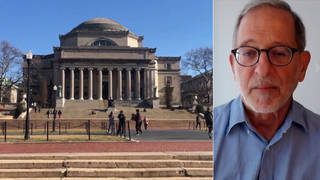
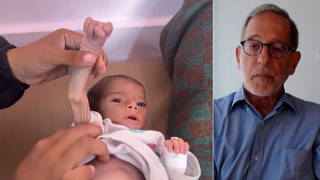
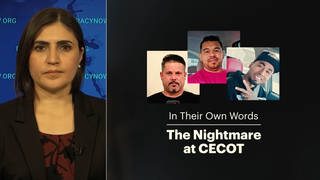
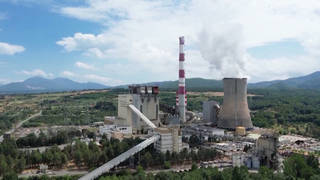





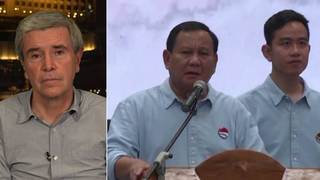

Media Options